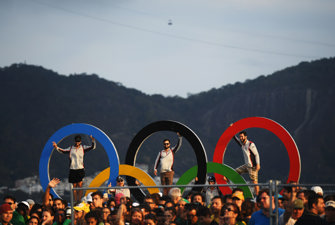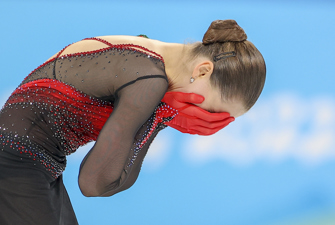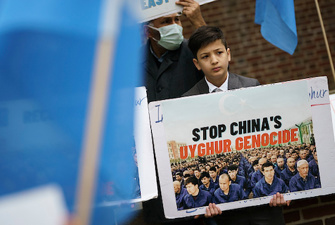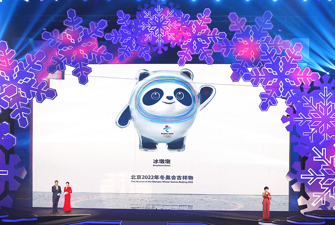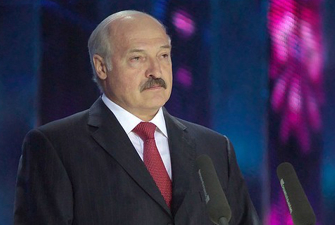New study shows that democracies have outpaced autocracies in the Olympic race
According to a new study political regime type still matters in the international sporting arms race. Democracies are more successful in winning medals at the Summer Olympics while the picture is more complex at the Winter Olympics.
According to a new study published in the 'International Journal of Sport Policy and Politics' democracies have taken the lead in the global sport arms race since the end of the Cold War - particularly at the Summer Olympics.
The study by Rasmus K. Storm, research director at the Danish Institute for Sports Studies, and professor Tor Georg Jakobsen from the Norwegian University of Science and Technology analyses the relationship between political regime types and sporting success using data from the Olympic Games.
The dataset encompasses the Summer Olympics from 1996 (Atlanta) to 2020(21) (Tokyo) and the Winter Olympics from 1994 (Lillehammer) to 2022 (Beijing). It includes data on 149 nations for the Summer Olympics and 90 countries for the Winter Olympics throughout the period examined and takes various factors into account such as GDP per capita, population size, military spending, and gender inequality.
During the Cold War period, the Olympic medal tables were dominated by socialist autocracies from the Eastern Bloc. However, the fall of the Iron Curtain in 1989 marked a significant shift and presented Western liberal democracies with the opportunity to challenge and potentially surpass their former rivals in the Olympic arena.
Sporting success remains a key priority for nations
The relationship between elite sports success and political regimes is a topic of immense interest from both academic and political standpoints, and this study underscores the enduring link between sports and international politics.
Since the end of the Cold War, the pursuit of international sporting achievements has remained a key priority for nations. Elite sports events, the victories of top athletes, and major sporting spectacles are increasingly harnessed to bolster a nation's image and showcase the might of different political regimes and nations. Notable instances include the 2008 Summer Olympics in Beijing, the 2014 FIFA World Cup in Brazil, the 2014 Winter Olympics in Sochi, and the 2022 FIFA World Cup in Qatar.
These events are strategically designed to draw the attention of other countries, signalling the host nations' aspirations to become recognised as superpowers, either in sports or in a broader geopolitical context. At the same time, many of these host nations aim to achieve sporting success and underline their global importance.
Political regime type still matters
The study's main finding is that political regime type still matters in the international sporting arms race. Further, the study finds a positive correlation between democratic regime types and success at the Summer Olympics. More specifically, democratic nations have stepped up and are now leading.
This is clearly illustrated in the figure displaying the share of medals at the Olympics following the collapse of the Iron Curtain and split by political regime type as defined by the Polity5 score developed by the Polity Project.
The Polity Project classifies national scores from -10 to +10, with different ranges representing various types of political regimes. Low scores indicate autocratic regimes, such as China. Higher scores indicate regimes with some kind of democratic traits, up to full democracies, including countries like the USA or Germany.
Figure: Political regime type and share of medals at the Summer Olympic Games
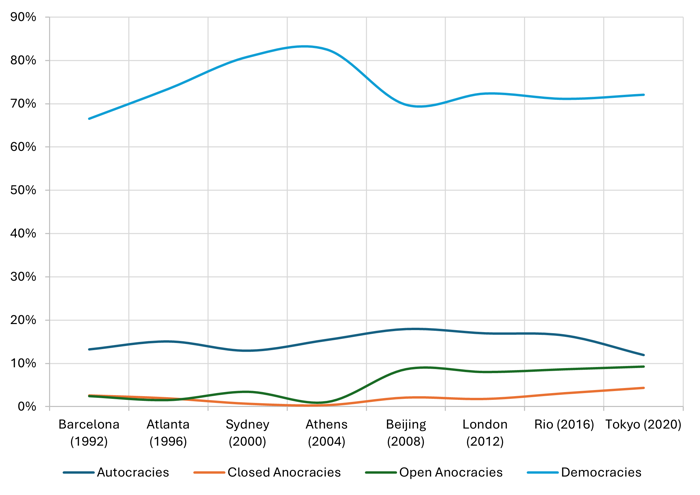
The authors attribute the democratic power at the Summer Olympics to several factors, including the fact that the collapse of the Eastern Bloc left its athletes without support and resources to train and compete. Further, many Western democracies started to adopt models for elite sports from former Eastern Bloc countries, including more funding and systematic national support for elite athletes.
The new approach has bolstered the competitiveness of democratic nations such as Australia, Canada, New Zealand, Denmark, Holland, Great Britain and France.
Less democratic nations are more dominant in the Winter Games
The medal tables of the Winter Olympics tell a more nuanced story.
The study indicates that less democratic countries are more dominant in winter sports relative to the case of the Summer Olympics. Still, because the share of (participating) democratic nations is high at the Winter Olympics, these nations, on the whole, win the largest number of medals.
However, as some autocracies like China and Belarus also win a lot of medals, the relationship between democracy and sporting success is not as clear as in summer sports.
These findings highlight the dynamics at play in winter sports, where factors such as climate and investment in specialised (and expensive) sports infrastructure for winter sports also influence the outcomes. Some dominating autocracies have invested heavily in infrastructure and athletes to succeed. This is the case for Russia that hosted the Winter Olympics in Sochi in 2014, and China in Beijing in 2022.
The authors predict that with rising international tensions, a Cold War-like rivalry on the sporting stage could re-emerge. Democratic nations may need to ramp up their investments to keep their position.
The recent conflict in Ukraine following Russia's invasion, along with growing tensions between China and the United States, suggests that sporting rivalries between different political regimes are likely to intensify soon.
Future studies look at the strategies employed by different regime types
While the results of the paper underscore that political regime type matters in relation to international sporting success, it has some limitations that should be investigated in future research.
One interesting question is related to the specific mechanisms behinthe urge for sporting success among democratic nations. Why is it so important for these nations to lead the international sporting arms race? Are there other causes beyond simply prestige?
Further, and connected to this, are there differences in how various political regime types value different sports disciplines? Disaggregating the data by disciplines could provide new insights into this matter and would be an interesting topic for future exploration.
The article 'The Arsenal of Democracy? An Examination of Political Regime Types’ Success in the Global Sporting Arms Race Following the Collapse of the Iron Curtain' is published in the 'International Journal of Sport Policy and Politics'.





